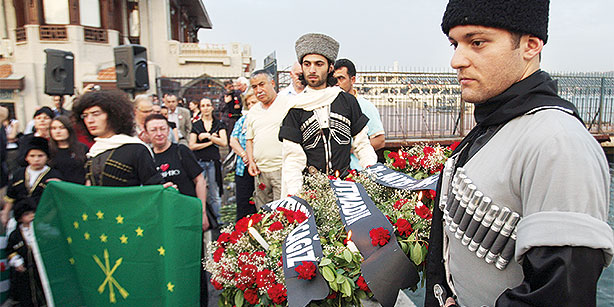
Turkish Circassians Reject Proffered Alliance With Kurds
Publication: Eurasia Daily Monitor Volume: 12 Issue: 64
By:

Most ethnic minorities around the world are generally appreciative of support from other ethnic minorities, viewing such solidarity as useful to their cause. But there are exceptions, and one of them is now very much on public view: the Circassian diaspora in Turkey, which may number as many as five million people, has made it clear that its leaders do not want the support that the Kurds, an even larger ethnic minority in that country, are offering. That unusual situation reflects the current situation and goals of the Circassians and of the Kurds, on the one hand, and the realities of Turkish and international politics, on the other.
Because of the Russian mass murder and brutal exile of the Circassians in 1864, as well as subsequent tsarist and Soviet oppression of them and other North Caucasians, practically all of the peoples from that region have diasporas in Turkey (see Egbert Wesseling, “The North Caucasian Diaspora in Turkey,” accessed April 7). But far and away the largest and most active of these is the Circassian diaspora, not only because of their numbers and integration in Turkey’s national security structures, but also because of the boost they received as a result of international coverage of their cause in the run-up to the 2014 Sochi Olympiad on the 150th anniversary of their expulsion from Russia to Turkey.
The Circassians have not achieved everything they would like within the Turkish political system—Ankara has not yet officially recognized the events of 1864 as a “genocide” or set up a Circassian-language service on Turkish radio and television. Nonetheless, according to Saslanbek Isayev, who writes for Kavkazskaya Politika, Turkey’s Circassians have made remarkable strides in recent years and believe they can achieve even more in the future as long as they do not compromise themselves in any way in the eyes of the Turks (Kavpolit.com, April 4).
In the last few years, Isayev points out, the Circassians have succeeded in convincing Ankara to create Circassian (Adygey)–language faculties at Turkish universities and to allow the teaching of their national language in the country’s public schools. Only the Turks, the Kurds, and the Arabs enjoy greater freedoms than that. To reach their other goals, including the recognition of the tragic events of 1864 as a “genocide,” Turkey’s Circassians realize that they need more than civic activism, which they have displayed regularly over the last decade. They need political power. And that, in turn, means that to press their case, they must find a way to enter parliament themselves or ally themselves with a political party that can.
The Circassians’ own political party, the “Democratic Party of the Majority” (CDP) was only recently registered, and its candidates are taking part in the current elections only in single-mandate constituencies outside of party lists. But according to all polls, the party itself has no chance of exceeding the ten-percent barrier and placing its representatives in the Grand National Assembly.
The Circassians are also pursuing other means: Circassian candidates have been nominated by a variety of other parties, including the ruling Justice and Development Party (AKP). And this has sparked interest in various parts of the Turkish political system in attracting Circassian support to their causes. That, of course, represents both an achievement of sorts and a high-risk situation for the Circassian diaspora. If it allies itself too closely with one party, the Circassian community may find itself excluded from the political process if that party fails to enter the parliament or if that political faction later decides that it can afford to dispense with the Circassians and ignore their demands.
Circassians are among the supporters not only of the AKP but also the National Movement Party and the Kemalist Republican People’s Party. But their relationship with Turkey’s fourth largest party, the People’s Democratic Party, the political wing of the Kurdistan Workers’ Party (PKK), is extremely complicated.
On the one hand, the Kurdish party has openly courted the Circassians, supported their two current goals, and even pushed their program in the parliament and in the government, albeit unsuccessfully so far. But on the other, most of Turkey’s Circassians have no wish to be associated with what they and many Turks view as Kurdish terrorists. Indeed, Isayev points out, the Circassians have a long tradition of serving in the Turkish military and security services, and they have personally participated in anti-Kurdish operations.
Moreover, some Kurds have been extremely clumsy in their approach to the Circassians and other North Caucasians, playing to the extreme nationalist parts of their political spectrums and offending many of Turkey’s Circassians—most of whom view themselves more as Turkish citizens than as émigrés, according to the “Kavkazskaya politika” writer. Consequently, most Circassians in Turkey support other parties, even though the Kurds have gone out of their way to try to enlist them. The Circassians do not want to be frozen out of Turkish politics; and they are clearly convinced that siding with the Kurds would leave them out in the cold.




